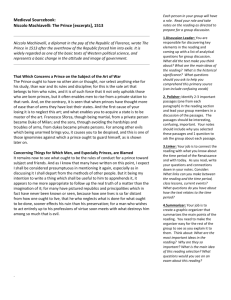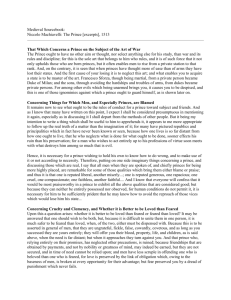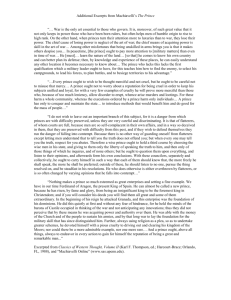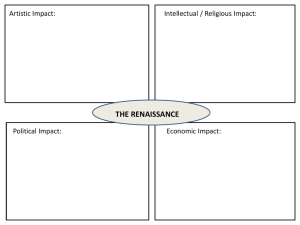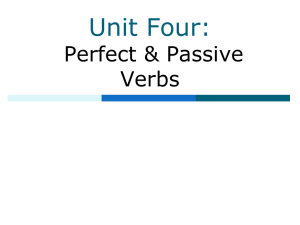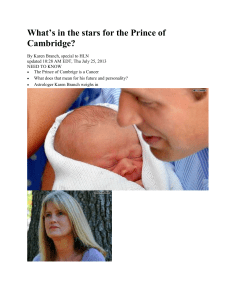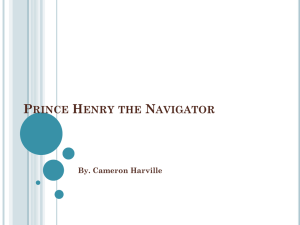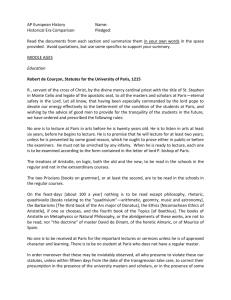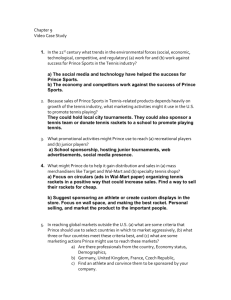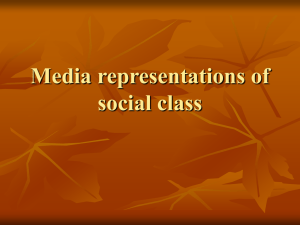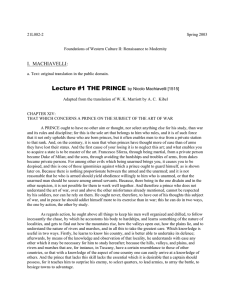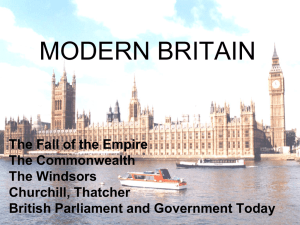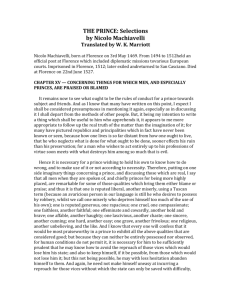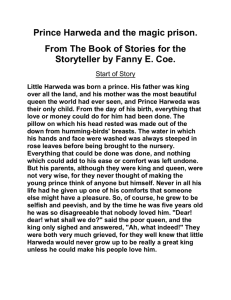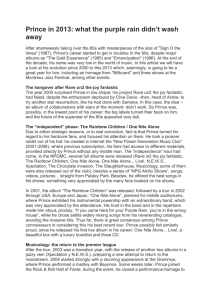Excerpt from Sir Thomas More`s Utopia, Book 2. [LAWS AND
advertisement
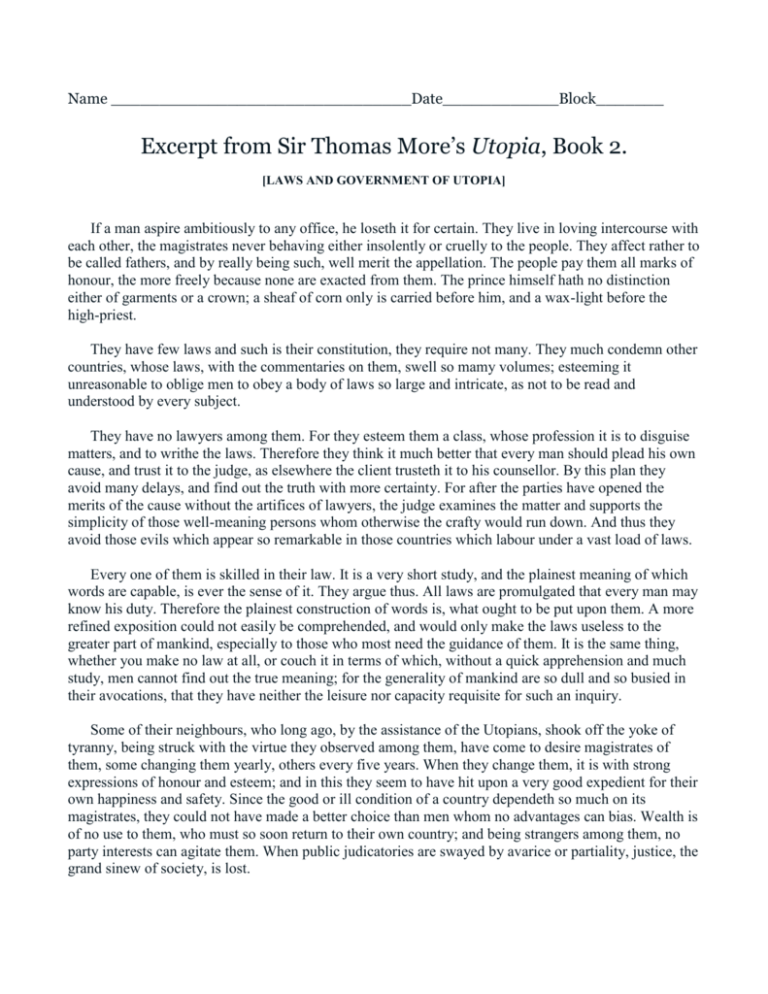
Name _______________________________Date____________Block_______ Excerpt from Sir Thomas More’s Utopia, Book 2. [LAWS AND GOVERNMENT OF UTOPIA] If a man aspire ambitiously to any office, he loseth it for certain. They live in loving intercourse with each other, the magistrates never behaving either insolently or cruelly to the people. They affect rather to be called fathers, and by really being such, well merit the appellation. The people pay them all marks of honour, the more freely because none are exacted from them. The prince himself hath no distinction either of garments or a crown; a sheaf of corn only is carried before him, and a wax-light before the high-priest. They have few laws and such is their constitution, they require not many. They much condemn other countries, whose laws, with the commentaries on them, swell so mamy volumes; esteeming it unreasonable to oblige men to obey a body of laws so large and intricate, as not to be read and understood by every subject. They have no lawyers among them. For they esteem them a class, whose profession it is to disguise matters, and to writhe the laws. Therefore they think it much better that every man should plead his own cause, and trust it to the judge, as elsewhere the client trusteth it to his counsellor. By this plan they avoid many delays, and find out the truth with more certainty. For after the parties have opened the merits of the cause without the artifices of lawyers, the judge examines the matter and supports the simplicity of those well-meaning persons whom otherwise the crafty would run down. And thus they avoid those evils which appear so remarkable in those countries which labour under a vast load of laws. Every one of them is skilled in their law. It is a very short study, and the plainest meaning of which words are capable, is ever the sense of it. They argue thus. All laws are promulgated that every man may know his duty. Therefore the plainest construction of words is, what ought to be put upon them. A more refined exposition could not easily be comprehended, and would only make the laws useless to the greater part of mankind, especially to those who most need the guidance of them. It is the same thing, whether you make no law at all, or couch it in terms of which, without a quick apprehension and much study, men cannot find out the true meaning; for the generality of mankind are so dull and so busied in their avocations, that they have neither the leisure nor capacity requisite for such an inquiry. Some of their neighbours, who long ago, by the assistance of the Utopians, shook off the yoke of tyranny, being struck with the virtue they observed among them, have come to desire magistrates of them, some changing them yearly, others every five years. When they change them, it is with strong expressions of honour and esteem; and in this they seem to have hit upon a very good expedient for their own happiness and safety. Since the good or ill condition of a country dependeth so much on its magistrates, they could not have made a better choice than men whom no advantages can bias. Wealth is of no use to them, who must so soon return to their own country; and being strangers among them, no party interests can agitate them. When public judicatories are swayed by avarice or partiality, justice, the grand sinew of society, is lost. Niccolo Machiavelli: The Prince 1513 That Which Concerns a Prince on the Subject of the Art of War The Prince ought to have no other aim or thought, nor select anything else for his study, than war and its rules and discipline; for this is the sole art that belongs to him who rules, and it is of such force that it not only upholds those who are born princes, but it often enables men to rise from a private station to that rank. And, on the contrary, it is seen that when princes have thought more of ease than of arms they have lost their states. And the first cause of your losing it is to neglect this art; and what enables you to acquire a state is to be master of the art. Francesco Sforza, though being martial, from a private person became Duke of Milan; and the sons, through avoiding the hardships and troubles of arms, from dukes became private persons. For among other evils which being unarmed brings you, it causes you to be despised, and this is one of those ignominies against which a prince ought to guard himself, as is shown later on. Concerning Things for Which Men, and Especially Princes, are Blamed It remains now to see what ought to be the rules of conduct for a prince toward subject and friends. And as I know that many have written on this point, I expect I shall be considered presumptuous in mentioning it again, especially as in discussing it I shall depart from the methods of other people. But it being my intention to write a thing which shall be useful to him to apprehends it, it appears to me more appropriate to follow up the real truth of a matter than the imagination of it; for many have pictured republics and principalities which in fact have never been known or seen, because how one lives is so far distant from how one ought to live, that he who neglects what is done for what ought to be done, sooner effects his ruin than his preservation; for a man who wishes to act entirely up to his professions of virtue soon meets with what destroys him among so much that is evil. Hence, it is necessary for a prince wishing to hold his own to know how to do wrong, and to make use of it or not according to necessity. Therefore, putting on one side imaginary things concerning a prince, and discussing those which are real, I say that all men when they are spoken of, and chiefly princes for being more highly placed, are remarkable for some of those qualities which bring them either blame or praise; and thus it is that one is reputed liberal, another miserly...; one is reputed generous, one rapacious; one cruel, one compassionate; one faithless, another faithful.... And I know that every one will confess that it would be most praiseworthy in a prince to exhibit all the above qualities that are considered good; but because they can neither be entirely possessed nor observed, for human conditions do not permit it, it is necessary for him to be sufficiently prident that he may know how to avoid the reproach of those vices which would lose him his state... Concerning Cruelty and Clemency, and Whether it is Better to be Loved than Feared Upon this a question arises: whether it is better to be loved than feared or feared than loved? It may be answered that one should wish to be both, but, because it is difficult to unite them in one person, it is much safer to be feared than loved, when, of the two, either must be dispensed with. Because this is to be asserted in general of men, that they are ungrateful, fickle, false, cowardly, covetous, and as long as you successed they are yours entirely; they will offer you their blood, property, life, and children, as is said above, when the need is far distant; but when it approaches they turn against you. And that prince who, relying entirely on their promises, has neglected other precautions, is ruined; because friendships that are obtained by payments, and not by nobility or greatness of mind, may indeed be earned, but they are not secured, and in time of need cannot be relied upon; and men have less scruple in offending one who is beloved than one who is feared, for love is preserved by the link of obligation which, owing to the baseness of men, is broken at every opportunity for their advantage; but fear preserved you by a dread of punishment which never fails. Nevertheless a prince ought to inspire fear in such a way that, if he does not win love, he avoids hatred; because he can endure very well being feared whilst he is not hated, which will always be as long as he abstains from the property of his citizens and subjects and from their women. Instructions and questions (please answer on a separate sheet of paper): 1. Write a one-paragraph summary of the excerpt of Utopia. 2. Write a one-paragraph response to this excerpt. Do you think this type of society is possible? Why or why not? 3. Write a one-paragraph summary of the excerpt of The Prince. 4. Write a one-paragraph response to this excerpt. Do you agree or disagree with Machiavelli’s recommendations for a leader/prince?

